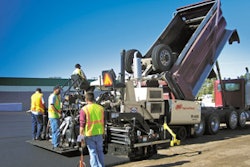On a recent visit with two different contractors in a period of two weeks I was surprised that both had difficulty holding their crews accountable. Both contractors -- good guys with actually pretty good crews working for them -- had challenges with their crew leaders completing “pre-start” check sheets that helped the crews make sure they had working equipment, water in their rollers, tires with the right amount of air and all of the needed barricades for blocking driveways.
I had worked with both contractors this past winter, preparing their “SOP’s” so that each crew would have documented process steps lined out for any new employee to read and follow. They had also conducted some “spring training” with their crew leaders for two days, preparing them with leadership training, inspecting equipment, and going over the required documentation, including the “pre-start” check sheets.
While both contractors admitted to their seasons beginning with full compliance by their crew foremen, they also admitted that things began to slip about the end of June and just continued through most of July. Two things I realized was happening:
- The summer heat was beginning to wear down the crew foremen and crew members as an increasing amount of mistakes were trickling up.
- The contractors, not wanting to anger their crew leaders and crews, simply backed off the requirement to complete their “pre-starts” each morning before the crews left.
While I completely understood the contractor’s reluctance, we still discussed the consequences. Quite honestly, I was lucky with one contractor as he had already begun to see some increased costs associated with poor quality of work due to some of the needed tools begin damaged and equipment operating poorly. Also, he was seeing more callbacks from customers because his crews had increasingly performed the wrong work or performed poor work. This same contractor had also confirmed that his crews were making several trips a day back to the yard because they had forgotten something earlier in the morning.
This first contractor was easy to convince to re-establish his compliance requirement and he immediately saw improvement. The second contractor, however, was harder to convince.
The second contractor had not experienced as many increased problems during the first four or five weeks of the non-compliance period. When I made my late-July visit he wasn’t feeling any substantial “pain” due to poor quality, equipment downtime, simple memory lapses etc. But this soon changed.
Before the month was up this second contractor called me and said, “OK, it’s starting to happen…just like you predicted.” While I wasn’t glad that he confirmed my prediction, it did confirm that even the best of leaders and crews can, soon or later, begin to be less than stellar if they do not hold to some strong and proven preventive efforts.
If you’re reading this article I’m sure you can identify with those periods of days, maybe weeks, where poor work habits might go unnoticed in the final result. Trust me, this is always short-lived!
Don’t hope that you and your workers will not make a mistake. Take the smart and physical steps to prevent easily preventable mistakes before they happen. This is the very heart of lean construction, quality work, continuous improvement and more.
Implement the following techniques to insure greater quality…the first time:
1. Document required “pre-start” checks. This can include checking all tires, oil levels, the right type and amount of tools, equipment, etc.
2. Inspect completed “pre-start” checks before trucks leave yard
3. Require crew leaders to discuss daily job needs, tasks, and “Who’s doing what today?”
4. Conduct random job inspections to insure work process compliance & quality
5. Document end-of-workday condition & needs of equipment, tools etc.
These five techniques are very simple to create and implement. The most difficult thing about this is the consistency that needs to be executed. Our workers must fight all sorts of issues including weather conditions, equipment downtime, material trucks showing up late to the site and poor attitudes by some workers. That’s why even more attention and accountability must be in place, especially when the crews have been putting in long hours in challenging weather conditions.
Don’t give in as a contractor or field leader. Leading workers often requires that they be held accountable when they are tired and weary. It’s exactly at this stage that mistakes, sometimes very costly mistakes, are made and can cost you much of your projected profits.
Brad Humphrey is President of Pinnacle Development Group, a consulting firm that specializes working with contractors of all sizes and specialties. For more advice from Brad on a wide range of topics, be sure to check out www.thecontractorsbestfriend.com where Brad will provide you with a mini-educational seminar each Wednesday. Also, for more information about Brad’s company please go to www.pinnacledg.com.



















